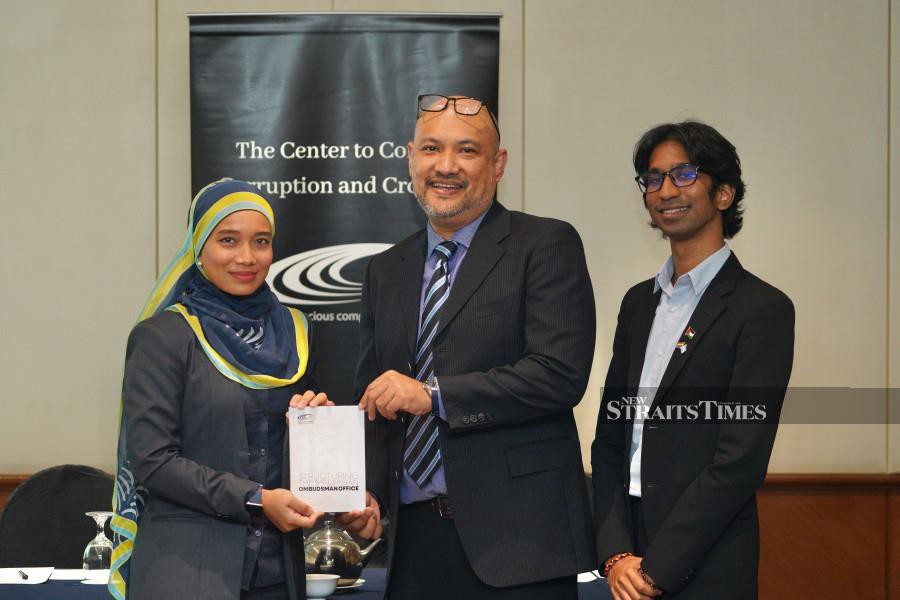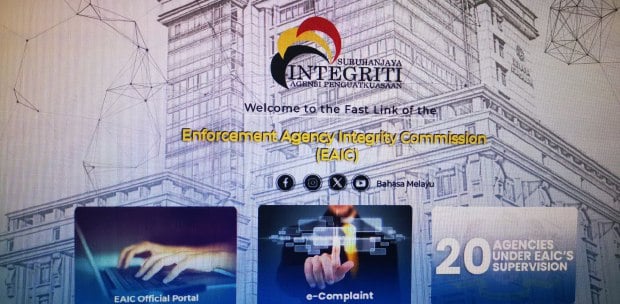KUALA LUMPUR: The Enforcement Agency Integrity Commission (EAIC) should be merged into the proposed Ombudsman Office, due to their similarity of functions in investigating maladministration.
Centre to Combat Corruption & Cronyism (C4) policy and legal research officer Prishanth Linggaraj said consolidating efforts and resources between the Ombudsman and the EAIC, which deals with misconduct by enforcement officers, can result in a more streamlined and effective oversight infrastructure.
"It (Ombudsman Office) should be given a broad investigative power to probe into public complaints, including the ability to seek cooperation from government agencies and unrestricted access to relevant documents and premises.
"At the state level, a similar agency should be established, as the federal Ombudsman would not have the authority to oversee state public services due to the constitutional separation of powers between the federal and state governments," he said at the launch of the "Structuring the Malaysian Ombudsman Office" report.
C4 chief executive officer Pushpan Murugiah said the body should be placed under the parliament to ensure its autonomy and independence from the executive branch.
"To ensure transparency, a statutory requirement should be introduced for government agencies in providing details written if the Ombudsman Office's recommendation is not followed, that would then be referred to a parliamentary select committee.
"It is hoped that the Ombudsman will act as a catalyst for the reforms to be identified and implemented moving forward," he said.
He said the role of Ombudsman should be viewed as conciliatory and incentivise moves for the reforms rather than penalising civil servants.
The 126-page report is available online at https://c4center.org/c4-center-report-structuring-the-malaysian-ombudsma...
It pointed out the Public Complaints Bureau's lack of statutory foundation and vulnerability to political interference, among others.
Establishing an Ombudsman with statutory powers, independent from direct government control, can prevent such risks and enhance public confidence, it said.
Chief Secretary to the Government Tan Sri Mohd Zuki Ali said the initiative to establish the Malaysian Ombudsman is an important milestone for the country in its efforts to improve governance in the public service delivery system.
Meanwhile, EAIC chairman Tan Sri Dr Ismail Bakar said it was willing to be the agency to spearhead the establishment of the Ombudsman Malaysia if the government agreed to consolidate the commission under the body.
"EAIC will comply with it if the government feels that it is the best step to uphold the integrity of civil servants in Malaysia.
"We are of the view that Ombudsman Malaysia should be granted a more effective function and authority in making an impact on efforts to eradicate misconduct and enhance integrity in the public sector," he told the New Straits Times,
He said Ombudsman Malaysia should have the jurisdiction over all ministries, departments and agencies without exemption given on any civil servants.
This includes unifying Ombudsman Malaysia with other commissions with roles similar to the EAIC to avoid overlapping roles in scrutinising misconduct and issues related to the integrity among the civil servants in the country, he said.






